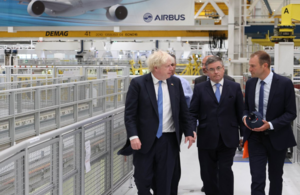Cabinet ministers see levelling up in action at Airbus factory
The Prime Minister, Chancellor and Secretary of State for Wales visit Airbus in Broughton to meet apprentices and see work being done to boost jobs.

The Prime Minister, Chancellor and Secretary of State for Wales visit Airbus in Broughton
The Prime Minister, Chancellor and Secretary of State for Wales have visited the Airbus factory in North Wales, where they saw the positive impacts of investment on jobs in the region and committed to helping families with the cost of living.
The ministers met a number of apprentices on Friday 12 August and discussed how improving skills and job prospects is vital in driving economic growth and levelling up across the UK.
In response to the latest GDP figures out today, which show the economy contracting by 0.1% in the three months to June, the Chancellor reaffirmed that it is his “top priority” to work alongside the Bank of England to get inflation under control and grow the economy.
The visit comes as stats show that over 7 million bank accounts across the UK have received the first £326 cost of living payment, with a further £324 to come in the autumn. Workers across Wales also saw a cut in their National Insurance contributions last month, representing savings of £396 million across households this year.
Prime Minister Boris Johnson said:
It is companies like Airbus who are driving forward economic growth, levelling up and supporting thousands of highly skilled jobs for people up and down the United Kingdom.
It was fantastic to visit their Broughton site in North Wales - the world’s largest wing manufacturing plant - to see their work in action and hear from apprentices at the start of their careers at Airbus.
We will continue to help people across the country to find good jobs and support them through the cost of living challenges.
Chancellor of the Exchequer Nadhim Zahawi said:
It’s great to be here in Wales to meet such enthusiastic and talented apprentices.
I know times are tough and people in Wales are concerned about rising prices. That’s why the government is providing an unprecedented £37 billion worth of support to help households, including a £400 discount on energy bills for every household in Wales this winter.
But it’s important to remember there are pockets of optimism – the unemployment rate in Wales is at a historically low level, and businesses like Airbus are announcing huge new investments, which will boost people’s prospects in the region.
The UK recovered strongly from the pandemic, with the fastest growth in the G7 last year, and I’m confident that we can also overcome the global challenges we now face.
Secretary of State for Wales Sir Robert Buckland said:
During extremely challenging times, the UK Government is focused on growing the economy and increasing opportunity for people across Wales.
Alongside the support we are providing to Welsh households, it is fantastic to see a company like Airbus investing in its workforce with its plans to create 550 jobs, build on its apprenticeship programme and boost its production facilities in Broughton.
Airbus Senior Vice President and Head of Broughton Plant, Jerome Blandin, said:
It was fantastic for the Prime Minister, Chancellor and Secretary of State for Wales to visit our site in Broughton today and meet some of our wonderful staff.
Airbus has invested heavily in its workforce and facilities in North Wales, the South West and around the UK, contributing significantly to the government’s levelling up agenda. We have trained more than 1,100 apprentices over the last ten years and spend about £250 million each year on Research and Development here in the UK.
In May, Airbus announced an increase in the production rate of our single aisle commercial aircraft to an unprecedented 75 A320 Family aircraft per month by November 2025. For the UK, this means we will increase our workforce in North Wales by 550 and invest an additional £100 million in additional production facilities by 2025 to meet this increased global demand.